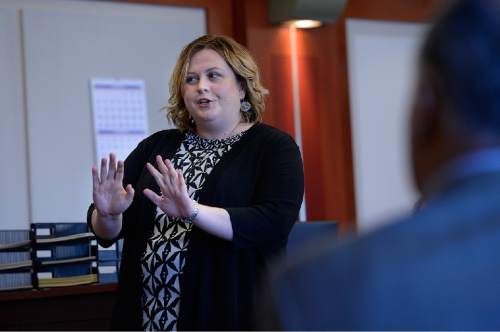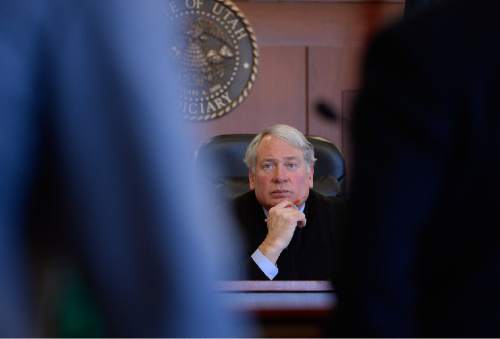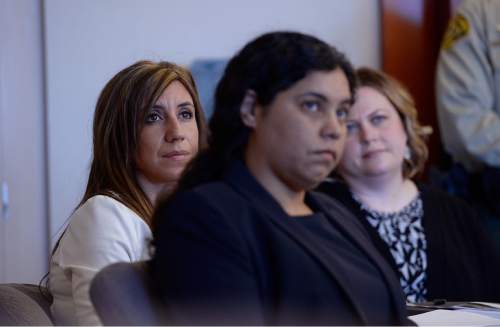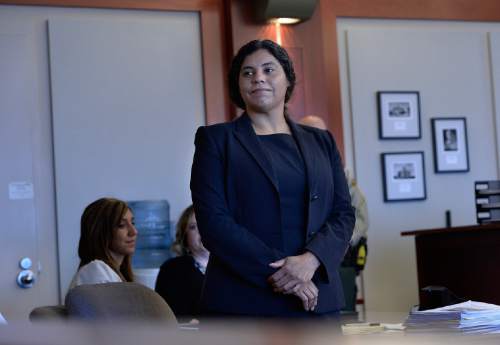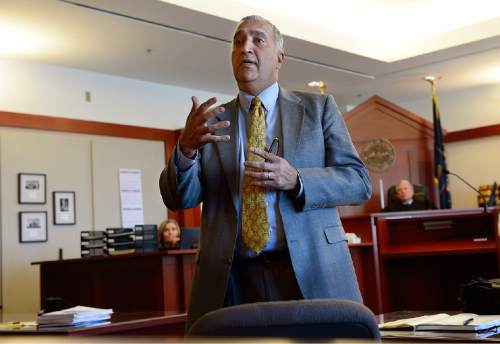This is an archived article that was published on sltrib.com in 2015, and information in the article may be outdated. It is provided only for personal research purposes and may not be reprinted.
The judge is the commanding officer.
The court workers are the company staff.
The mentors are the fireteam leaders.
And the defendants? They're the troops.
That's the organization of the new veterans' court in 3rd District Court in Salt Lake City. Judge Royal Hansen spelled out the military-style structure Thursday to the first squad of defendants to be admitted.
The defendants — all of whom must have served in the armed forces and qualify for veterans benefits and already be under probation or prepared to enter a plea in abeyance in order to be admitted into veterans court — are currently convicted or charged with offenses ranging from drug possession to aggravated assault. Some of them face years in prison if convicted in a conventional Utah court.
The veterans' court gives them an opportunity to forgo incarceration if they don't commit any new offenses, stay sober, receive counseling and report every Thursday morning to Hansen's courtroom. Hansen may let some defendants appear less frequently as they progress.
"It's not a free pass," Hansen explained to everyone in the courtroom Thursday. "Even though [the veterans have served], they're accountable for their actions after service."
Unless the veteran is disabled, Hansen also will require him or her to find a job or attend school. Hansen also plans to pair the defendants with mentors, preferably from the same branch of the armed forces in which the defendant had served.
Hansen is not admitting defendants who may pose a violent risk or be a bad influence to others in the program. Failing veterans' court means revoking probation or reinstating charges and the possibility of jail or prison.
Six defendants appeared in veterans' court Thursday.
The first was a 49-year-old man in shackles and a dark blue Salt Lake County jail jumpsuit. He is charged with two counts of drug possession — cocaine and heroine, according to court documents — with intent to distribute. Each count is a second-degree felony that carries a potential punishment of one to 15 years in prison.
The defendant told Hansen he plans to attend the next veterans' court hearing and enter a plea in abeyance. That means he will plead guilty but the plea will be set aside and the case dismissed or reduced to a lesser offense in as little as one year if he breaks no more laws and complies with terms of the veterans' court.
"We think you'll make a significant contribution and it will be a good thing for you and the court," Hansen told the defendant.
Hansen allowed The Tribune to attend Thursday's hearing on the condition the newspaper not photograph, name or seek interviews from the defendants.
The goal of veterans' court is to connect defendants to veterans' services and help them exit the criminal justice system by graduating from court supervision. Hansen did not serve in the military, but he used to preside over a drug court in West Jordan. Drug courts are the model on which veterans' courts are based.
The defendants can receive substance abuse or mental health counseling from the veterans' programs or other public or private facilities. Representatives of the state and U.S. Department of Veterans Affairs were present for the first day of court, as were staff from the Utah Division of Workforce Services, and the Unified Police Department. Salt Lake County District Attorney Sim Gill was there and approved some plea agreements.
A veterans' court has been operating for years in Salt Lake City Justice Court and in the federal court in Salt Lake City. Another veterans' court is also scheduled to start this month in 4th District Court in Provo.
There are about 160,000 veterans in Utah. Not all of them are eligible for benefits, but it is widely believed that many veterans don't seek or can't get access to benefits. About 54,000 veterans receive benefits in the coverage area that includes Utah.
Amy Earle, the liaison to the criminal justice system for the Wahlen Veterans Affairs Medical Center in Salt Lake City, said veterans' courts have been able to make veterans seek services they were not pursuing.
Earle said one defendant in the Salt Lake City's veterans' court started using his health benefits and discovered a serious medical condition. He is now receiving treatment.
"While it's a sad thing," Earle said of veterans in trouble with the law, "it ends up being a positive."
Despite the military structure, the veterans' court still has some conventional American legal customs. The defendants will wear civilian clothing. There's no distinction between former enlisted men and officers.
In an interview Wednesday, Hansen said he planned to have the defendants call him "judge" or "your honor," not "sir" as a U.S. soldier, sailor or airman would address his commander. But Hansen said he might re-evaluate that later.
Hansen also didn't plan to have the defendants clap for one another, as defendants in drug court would do, each time a defendant completes a sober week or progresses. When a reporter suggested that the defendants yell the military cry "Hoorah!" the judge said he would look into that.
The last defendant Hansen saw at Thursday's hearing was a 54-year-old man also in shackles and a jail jumpsuit. He is charged with felonies for drug possession and aggravated assault. His lawyer, McCaye Christianson, told Hansen he was a "perfect candidate" for veterans' court because he wants to take advantage of his veterans' benefits. The defendant and prosecutors negotiated a deal where he enrolls in veterans' court and the felonies will be reduced to class A misdemeanors upon completion. The defendant could enter the plea in abeyance at the next hearing.
Hansen welcomed the defendant to veterans' court, but warned him expectations will be high.
"I'll see you next Thursday at 10 o'clock," Hansen said. "We look forward to big things."
Twitter: @natearlisle


